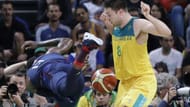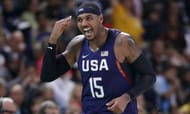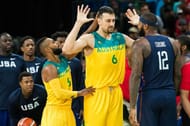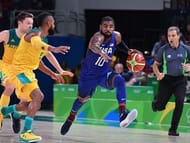Carmelo Anthony must have had flashbacks from a decade ago when he led Team USA in scoring against Greece in the FIBA Championships. He had a game-high 27 points then, but to no avail, as Greece eliminated USA from gold medal contention.
That team comprised of LeBron James, Carmelo Anthony, Chris Paul, Dwyane Wade, Dwight Howard and Chris Bosh. That team lost 101-95 to Greece. The current team is inferior to that for sure.
Now, Anthony saw his team trailing to Australia for great portions of the game in the 2016 Rio Olympics. He wasn't going to have a repeat of 2006, and his daggers from downtown helped Team USA stave off the Australians. Kyrie Irving's 19 points helped as well.
Explore the NBA Draft 2024 with our free NBA Mock Draft Simulator & be the GM of your favorite NBA team.
Team USA is by no means invulnerable, as Australia showed when they almost defeated Team USA before the latter escaped with a victory. They were nearly taken to the cleaners by Matthew Dellavedova, Patty Mills, Andrew Bogut, Joe Ingles and Aron Baynes. None of those players will be seen in the all-star game come February.
Here are five weaknesses which can cost Team USA the gold medal:
1) Lack of a pure point-guard leading to isolation offence
Against Australia, Team USA fielded a starting lineup of Kyrie Irving, Paul George, Carmelo Anthony, Kevin Durant and DeMarcus Cousins. That is a lineup to be reckoned with, but it's no secret that Irving is more of an excellent scorer rather than a playmaker. Even the presence of LeBron James would have helped with the playmaking duties.
In the past, guards such as Jason Kidd, Deron Williams and Chris Paul have orchestrated the offence for Team USA, and all of them have averaged over 10 assists per game for multiple seasons.
The highest Irving has averaged is 6.1 assists per game for a season. Not to say that he isn't valuable, he's among the top 3 point guards in the league currently. But this team clearly lacks a playmaker, and there will be many other occasions when Team USA's offence will boil down to an isolation.
Even the backup point guard Kyle Lowry has career averages of 5.7 assists per game. Against Australia, the isolation offence bore fruit but barely. Irving and Anthony combined for 26 of Team USA's 28 points in the fourth quarter. The problem with isolation offence is that the shots have a higher degree of difficulty. You can't rely on them for the entire course of a tournament.
Unless Team USA can orchestrate an offensive system which doesn’t result in bailout possessions, they could be in for trouble.
2) Over-eager perimeter defense and poor switching
For some inexplicable reason, Team USA has chosen to guard the perimeter at the expense of the paint. There were innumerable occasions when a Team USA player had to choose between falling back into the paint or sticking with a player on the perimeter, and they chose the latter in the match vs Australia.
See Andrew Bogut's easy ally oop at 8:07 in the first quarter. See DeMarcus Cousins choosing to switch to Andrew Bogut of all people on the perimeter on a switch and leave Patty Mills wide open for a layup at 9:17 in the 2nd quarter with nobody in the paint
We had DeAndre Jordan looking at the perimeter while a 7 foot Bogut sneaks behind him with his limited vertical for an ally-oop. Andrew Bogut again found himself all alone in the paint as two Team USA players ran out on the perimeter with 43 seconds left in the second quarter.
With 6:02 remaining in the 3rd quarter, Bogut was all alone in the paint again as Irving strayed on the perimeter on a switch. Unbelievably, Team USA continued to rush out to guard the perimeter and kept leaving players open for easy finishes inside.
In the NBA, players are accustomed to rotations among their teammates. They know that if they rush to the perimeter, the man behind them will switch. But this USA squad doesn't have that level of understanding among its members.
All this illustrates is that Team USA has a long way to go before it can consider itself a lockdown defensive squad. It takes time for teams to gel and get on the same page with regards to team defence. But if Team USA can be so easily exploited on defence, it doesn't bode well for their medal hopes.
3) Living and dying by the three ball
As the Golden State Warriors witnessed to their dismay in the NBA Finals, the three-ball giveth, and taketh away as well. It's a fickle mistress and a gamble at best if one considers it the primary weapon.
If Carmelo Anthony hadn't got hot from downtown against Australia, hitting 9 of 15 threes, USA could well have suffered its first loss over the last two Olympics. In the international game, the three point line being closer works both ways. While it is easier to make threes, it makes it that much more difficult to get quality looks inside.
In the past, when the USA defeated Spain in the gold medal games in 2008 and 2012, they’ve shot and made a lot more 3s compared to their opponents. They had a 45-21 advantage in 2012 and a 49-24 advantage in 2008 from downtown. Their luck has held in the past.
USA actually shot a better percentage from downtown (43.6%) compared to 2-point range (39.1%) against Australia. As teams continue to pack the lane, USA will be more enticed to launch it from afar. That can be their undoing on days when the three ball doesn't fall. They need to find a way to consistently work the ball around on offence and look for easier shots.
If a shooter like Curry can find his shot deserting him in the NBA Finals, it can happen to anyone.
4) Foul trouble
The Dream Team was revered by one and all, including their opponents who wanted pictures and autographs rather than blood. Back then, the USA had a dominant presence with names which were equivalent to adding a ten point lead to a contest before it even began.
The current team faces competition which is baying for their blood and isn't afraid to get dirty to win. Australia almost defeated the USA by pounding them at every opportunity. How many more blows will it take before DeMarcus Cousins or Kevin Durant or Draymond Green lose their cool and get into foul trouble?
DeAndre Jordan was clapping all the way down the court when he was called for a foul on Baynes when the latter walked down to shoot two free throws. Paul George pushed Delly down in frustration early in the game. Both Jordan and Cousins finished with 4 fouls. Cousins was limited by foul trouble and only played 10 minutes.
In spite of Andrew Bogut manhandling Team USA, he finished with just 2 fouls. This is the Australian team in 2016, not the Bad Boys Pistons of 1989. But Andrew Bogut came pretty close to earning a spot on that wrestling squad. It was clear that his antics got under the skin of some of his opponents, and his superb on-court play didn't hurt either.
If one is taking exception at how he's making unnecessary contact, we just have to look back to Kobe Bryant body-checking Pau Gasol in the 2008 Olympics for no reason to see that this is a tactic pursued by every team.
The NBA superstars are not going to get the superstar calls they are accustomed to in the home arenas where the crowd can influence the whistles. Also, five fouls can get you thrown out in international play.
Stephen Curry's ejection in the NBA Finals led to the greatest regular season team of all time losing the championship. It won't take many whistles to land Team USA in foul trouble.
5) Chemistry
Team USA is still searching for that ever elusive chemistry. One play saw Carmelo giving up an offensive rebound in favor of retreating into the corner for a potential three. Durant was the next USA player closer to the rebound, but he backpedaled all the way to halfcourt instead. And the ensuing confusion resulted in a Patty Mills three-pointer. Mills ended the game with 30 points.
There is no questioning the commitment and desire of the stars who've suited up to represent the USA, but there is no question that other countries have a lot more to gain from winning. Team USA has the best forwards in the entire competition. Kevin Durant, Carmelo Anthony and Paul George are undoubtedly among the Top 5 small forwards in the world, and any of them can play the 2 or 4 as well. But neither Durant nor Anthony are known as lockdown defenders. Nor are Irving and Lowry.
The much vaunted Dream Team of 1992 went undefeated through the exhibition games and the Olympics. But they were beaten in practice by a team of college players who were led by a point guard whose sole virtue was his penetration and passing abilities. Bob Hurley couldn't finish inside with consistency at that stage of his career, but he had no problems getting past Magic Johnson and finding looks for his teammates.
Against Australia, when Paul George was put on Matthew Dellevadova, that left Irving on Patty Mills. Mills dropped 30 points on the USA while Dellavedova added 11 assists. This results from broken plays and a search for identity. This team might not be good enough to figure it all out on the fly.
It only takes a few broken plays to see a gold medal slip away. Team USA will need to tighten up its game if it is to repeat this time at Rio Olympics.




